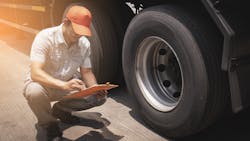Clark: Impact of tires on fuel economy and operating costs
I have not written about tires in a while, but I saw it was a topic discussed at American Trucking Association’s Management Conference & Exhibition last month. That prompted me to start thinking about tires again.
Tires are essential to a truck, but I think they sometimes don’t get the attention they deserve. Tire pressure is supposed to be checked during pre- and post-trip inspections, but tires sometimes get a cursory check, especially the inside tire in a dual tire configuration.
The Federal Motor Carrier Safety Administration reports that half of on-road breakdowns are tire-related. Underinflated tires may not cause all of those breakdowns, but I suspect they contribute to a large number of them.
In addition to putting trucks on the side of the road, underinflated tires result in a massive ding to fuel economy. It is estimated that there is a drop in fuel mileage of about 0.2% for every 1 psi drop in the recommended tire pressure. Underinflated tires can cause excess heat to build up, which can cause irregular wear and affect fuel economy.
See also: Michelin releases new app focused on tire maintenance and more
According to the U.S. Energy Information Administration, the average diesel price was $4.366 per gallon on Nov. 6. The American Transportation Research Institute’s Analysis of the Operational Costs of Trucking in 2023 found that tires account for 2% of a fleet’s operating budget, but fuel represents 28% of operating costs.
Anything that reduces miles per gallon of diesel will significantly impact a fleet’s bottom line.
That means fleets need to develop a stringent tire program that includes rigorous adherence to inspection schedules and in-depth analysis of tire failures to determine the root cause. Some failures are not preventable. As an example, debris on the road will cause some percentage of tire failures; however, failures due to improper tire inflation can be prevented.
See also: Bridgestone, Geotab partner to bring IntelliTire TPMS to fleets
Drivers must be reminded of the importance of paying attention to tires during pre- and post-trip inspections and should be encouraged to do more than cursory inspections. Tires should be inspected for wear, and inflation pressures must be checked when a truck is in the shop for regular maintenance or service.
Fleets may also consider investing in tire pressure monitoring or inflation systems that alert drivers when inflation pressure falls below desired levels and reinflate tires.
While tires are a fairly basic truck component, they can significantly impact fuel economy and operating costs. Paying close attention to inflation pressures can improve fuel efficiency and keep operating costs in check.
Jane Clark is vice president of member services for NationaLease. In this position, she is focused on managing the member services operation as well as working to strengthen member relationships, reduce member costs, and improve collaboration within the NationaLease supporting groups. Prior to joining NationaLease, Clark served as area vice president for Randstad, one of the nation's largest recruitment agencies, and before that, she served in management posts with QPS Cos., Pro Staff, and Manpower Inc.
About the Author
Jane Clark
Senior VP of Operations
Jane Clark is the senior vice president of operations for NationaLease. Prior to joining NationaLease, Jane served as the area vice president for Randstad, one of the nation’s largest recruitment agencies, and before that, she served in management posts with QPS Companies, Pro Staff, and Manpower, Inc.
